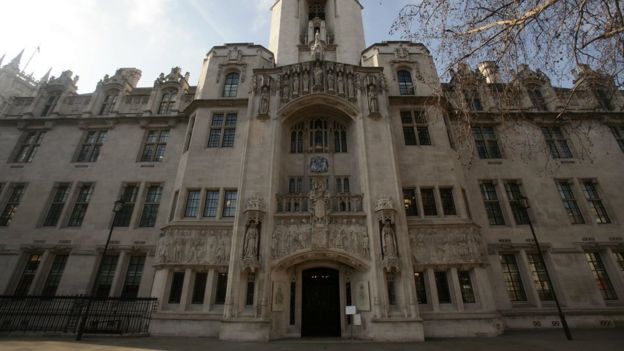
This article is more than
9 year oldNumber 10 confirmed the comment by a government lawyer in the High Court represented the "government's view".
The vote would take place after negotiations have taken place and with Brexit already triggered using Article 50 of the Lisbon Treaty.
Campaigners have been calling for a vote before Article 50 is triggered.
Open Britain, formerly the Remain campaign, said the government's comments were an "encouraging sign" but renewed calls for a debate and vote earlier in the process, before Article 50 begins two years of formal negotiations.
The UK is expected to leave the European Union in 2019.
Prime Minister Theresa May opposes a vote before Article 50, saying those calling for one are "trying to subvert" the outcome of June's referendum.
The issue is currently the subject of a landmark legal challenge, with the government defending what it says is its right to invoke Article 50 without Parliamentary approval.

It's the question pre-occupying many MPs as Britain prepares to leave the EU. What role will they have in shaping and approving the final withdrawal deal the UK reaches with Brussels? Theresa May plans to begin talks with the EU by the end of March and negotiations will last for two years.
The government's legal team have now clarified what they believe happens then.
James Eadie QC said it was "very likely" the UK and the EU would agree a new treaty that would have to be ratified by Parliament.
A law passed in 2010 gave MPs the power to block a treaty indefinitely. But in practice, would Parliament at that point derail the UK's withdrawal agreement with the EU?
David Pannick QC, acting for one of the claimants in the High Court case, said even if Parliament refused to approve the final Brexit deal, the UK would have to leave the EU anyway - with or without an agreement. That is why, he argued, parliament needed to vote before formal talks began.
Judges who heard the case said they would give their decision "as quickly as possible". An appeal to the Supreme Court later in the year is expected, whatever the outcome.
During the High Court hearing, government lawyer James Eadie QC moved on to what was likely to happen at the end of the negotiations, in 2019, saying: "The government view at the moment is it is very likely that any such agreement will be subject to ratification."
If this vote ends with MPs rejecting the Brexit deal, the UK would still leave the EU, Lord Pannick, who is acting for the campaigners challenging the government, told the court.
"Parliament cannot reverse the notification," he said.
The UK would either leave with no agreement or reach a new one, he said, adding: "But the new agreement cannot restore the rights that are irretrievably lost, and whether there is a new agreement is out of the hands of Parliament."
Labour's shadow Brexit secretary Sir Keir Starmer said: "A vote so late in the day would put MPs between a rock and a hard place. It would ask us to choose between a deal on the government's terms or leaving the European Union with no deal at all."
UK voters opted in favour of leaving the EU by 51.9% to 48.1% in a referendum in June.